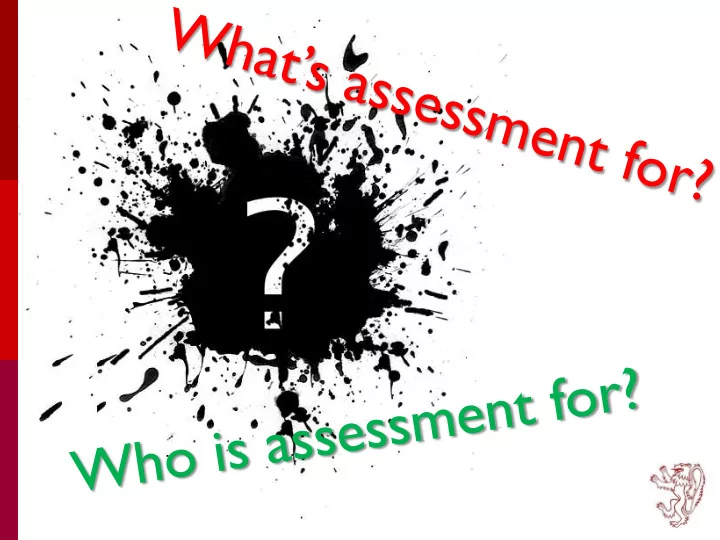

Assessments and Tests: an overview for parents March 2018
Test Time At the end of Year 2 your children will be assessed in Reading, Writing and Maths at either ‘emerging’, ‘expected’ or ‘exceeding’. This judgement is reached using: a) The result of a test b) A few pieces of work in class c) Careful assessment of all the work your children have produced throughout the year in class, including the statutory tests.
The School Curriculum: The school curriculum comprises all learning and other experiences that each school plans for its pupils statutory The National annual subject assessment Curriculum English mathematics science physical art and design education Sex and languages Relationships computing music Education history design and geography technology Religious Education The ‘basic’ curriculum
Assessing, recording and reporting Our assessment principles (see website) Ongoing formative assessment : helps teachers to understand children’s learning; plan and prepare lessons; a dialogue with children helping them know what to do to improve Marking in books Verbal discussion with children Mark books with, for example, spelling test scores Summative assessment : designed to give information that allows the school to track progress against national standards, monitor performance and give parents information End of year tests and reporting – standardised NFER tests; ‘SATs’ Formal Teacher Assessment uses test results to inform judgements Other formal assessments made during the year DfE summary about assessments at the end of key stages : click below https://www.gov.uk/government/collections/national-curriculum-assessments-information-for-parents
End of year reporting Our principles: We aim to give reliable and meaningful information to parents about how children are doing and how the school is performing. This information will be clear, transparent and communicated in a format that parents can understand and also use to assist their child’s future learning. Summative reporting ‘Emerging’; ‘Expected’; ‘Exceeding’ End of infants and juniors receive raw test scores and a standardised ‘scaled’ score
Assessment Process Nursery: track and report against EYFS framework Reception: end of year Early Years Foundation Stage assessment (17 Early Learning Goals: Emerging, Expected, Exceeding) Year 1: Phonics screening , track and report against National Curriculum Year 2: end of infants statutory Teacher Assessment Year 3: track and report against National Curriculum Year 4: track and report against National Curriculum Year 5: track and report against National Curriculum Year 6: end of year tests and Teacher Assessment We track and record every child’s progress in reading, writing and mathematics to ensure key knowledge and skills are understood. This is reported to parents at the end of the school year.
Year 1 : Phonics Screening Check Designed to confirm whether pupils have learnt phonic decoding to an appropriate standard. The check consists of 20 real words and 20 pseudo- words that a child reads aloud to the teacher.
Year 2 : End of Key Stage 1 Assessments End of year judgments At the end of Year 2 your children will be assessed in Reading, Writing and Maths at either ‘emerging’, ‘expected’ or ‘exceeding’. This judgement will be reached through careful assessment of all the work your children have produced throughout the year in class The statutory tests will form part of the overall teacher assessment judgement
Year 2 : End of Key Stage 1 Assessments These are the tests that contribute to the overall Teacher Assessment judgement: English reading Paper 1: combined reading prompt and answer booklet English reading Paper 2: reading booklet and reading answer booklet English grammar, punctuation and spelling Paper 1: spelling English grammar, punctuation and spelling Paper 2: questions mathematics Paper 1: arithmetic mathematics Paper 2: reasoning (There is no ‘writing’ test) Children receive a raw score from the test that is converted to a scaled score. 100 will always represent the ‘expected standard’. The maximum score possible is 115 and the minimum is 85.
Year 2 sample papers-reading
Spelling, punctuation and grammar
Maths - arithmetic
Maths-reasoning
Year 2: end of year expectations for 2018 - reading
Year 2: end of year expectations for 2018 - writing
Year 2: end of year expectations for 2018 - mathematics
Year 2: end of year expectations for 2018 – mathematics (continued)
Formative assessment - English
Formative assessment - Maths
Further information … Chase Bridge’s Assessment Principles http://chasebridgeprimary.fluencycms.co.uk/Assessment-principles Early Years Foundation Stage Framework https://www.gov.uk/government/publications/early-years-foundation-stage-framework--2 National curriculum in England: primary curriculum https://www.gov.uk/government/publications/national-curriculum-in-england-primary- curriculum Key Stage 1 Assessment and reporting arrangements https://www.gov.uk/government/publications/2018-key-stage-1-assessment-and- reporting-arrangements-ara National curriculum tests and scaled scores ( 2017) https://www.gov.uk/guidance/scaled- scores Teacher assessment frameworks at the end of key stage 1 https://www.gov.uk/government/publications/teacher-assessment-frameworks-at-the- end-of-key-stage-1 Teacher assessment frameworks at the end of key stage 2 https://www.gov.uk/government/publications/teacher-assessment-frameworks-at-the- end-of-key-stage-2
Recommend
More recommend